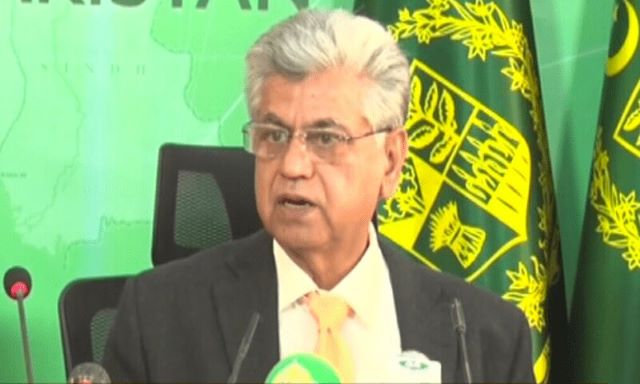After complaints of journalists’ harassment which did not go unnoticed before the top court, caretaker Federal Minister for Information Murtaza Solangi said Sunday that the state institutions probing into anti-judiciary campaigns reserve the legal right to issue notices.
Addressing a press conference besides the Director-General of the Federal Investigation Agency (FIA) Ahmad Ishaq Jahangir and other members of the Joint Investigation Team (JIT), the caretaker minister categorically rejected “harassment” and “witch-hunt” allegations against the government to target journalists and YouTubers.
He refuted media reports blaming the state authorities for “harassing” media persons via sending legal notices in the name of probing into a smear campaign against the judges and judiciary.
Solangi’s media talk came after the Chief Justice of Pakistan (CJP) Qazi Faez Isa took notice of the FIA compiling a list of journalists and YouTubers for allegedly running a smear campaign on social media against judges and judiciary.
He detailed that the caretaker government had constituted the JIT on January 17 which conducted two sessions on January 17 and January 23 to carry out a thorough investigation into the anti-judiciary campaign on social media.
The JIT traced 600 suspected social media accounts, named 100 suspects in the summary of identified persons, and registered 100 inquiries, said the caretaker minister, adding that 110 notices have been sent by the investigators, whereas, the suspects include 22 political workers and politicians, as well as 32 journalists.
During the media talk, a presentation was also shown to the journalists to highlight some of the social media accounts involved in running online campaigns to malign the judges and the judiciary.
He clarified that the move made so far was the issuance of notices sent to the suspected individuals. “Issuing notices to someone does not mean to harass someone or declare someone a criminal. If there is an arrest, FIR [First Information Report], house raid, abduction or chase then it can be called harassment.”
Solangi continued that under Article 19 of the Constitution, freedom of speech was not an indefinite thing as the law also imposed some reasonable restrictions i.e. running smear campaigns against the armed forces and the judiciary.
Criticism can be protected by law but not the campaigns based on insults and character assassination, he added. Criticism should be made in a civilised manner instead of levelling fabricated allegations.
The state won’t allow attacks on the government, institutions and the judiciary at any cost, Solangi stressed.
He added that the Supreme Court took up a case against the anti-judiciary campaign on social media and an action was likely to be taken against the responsible.
The minister said that the concerned institutions have the legal right to issue notices and they stood to their stance, adding that the JIT continued its probe without indulging in any illegal action.
After the JIT’s formation, there was a decline in such derogatory and character assassination campaigns, said Solangi.
To a question about the recommendations for a high-powered cyber authority, Solangi rejected the formation of a powerful body by the caretakers to control social media in Pakistan, saying that legislation can only be approved by the parliament but right now, the national assembly does not exist and Senate elections are also due in March.
On January 17, the caretaker government formed a five-member Joint Investigation Team (JIT) to ascertain the facts behind a malicious social media campaign against the Supreme Court judges after the apex court gave a verdict on election symbol of Pakistan Tehreek-e-Insaf (PTI).
The JIT was constituted under the Prevention of Electronic Crimes Act 2016 consists of officials from police, FIA and intelligence agencies.__The News





